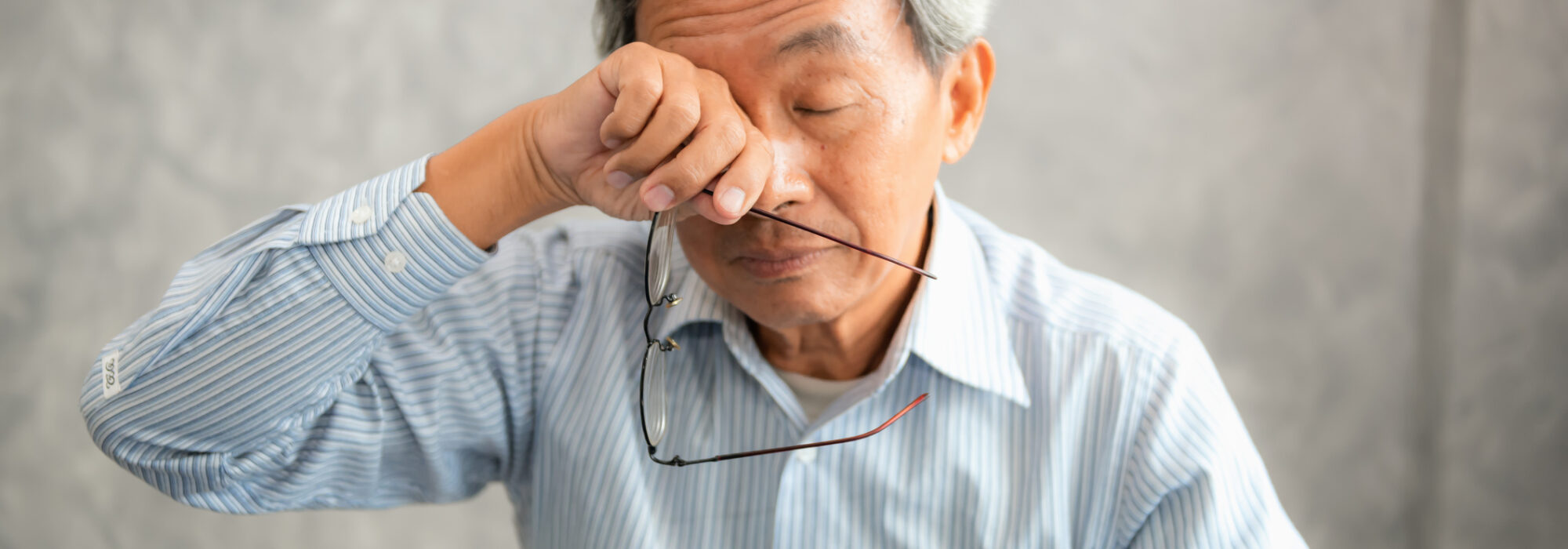
When listening feels like work
In this interview, Professor Graham Naylor shares the latest research on listening fatigue and why it might be one of the reasons driving clients to visit your clinic.

Graham Naylor, PhD
Scientific Programme Leader University of Nottingham School of Medicine
Professor Graham Naylor is Director of the Scottish Section of Hearing Sciences in Glasgow. He leads the section's research program in the areas of hearing disability and hearing aids, with projects seeking to understand real-life auditory behavior, improve methods of assessing disability and intervention benefit, and propose innovative solutions for hearing problems.
Contact the IntervieweeDo you ever feel exhausted at the end of the day? The idea of hearing-related fatigue was brought starkly to my attention when I moved to the German speaking part of Switzerland, my mother tongue being English. For the first time, communication became much more tiring for me, particularly in large groups, with lots of background noise or when I was working clinically in German. I came home exhausted, and realized my experiences may have overlaps with the fatigue our clients with hearing loss may experience. I was really interested to find out more about this fascinating topic and to know what we, as clinicians, can do to help. Dr. Graham Naylor kindly agreed to take part in an interview with me and share his wide expertise and research in this area. Thank you, Dr. Naylor!
Here is our interview…
Dr. Naylor, your research in the area of hearing loss and fatigue has been eye-opening for me as an audiologist. Those with hearing loss often describe fatigue when listing their symptoms but I think hearing care professionals don’t always know what to do with that information. Could you start by telling us, what exactly is fatigue?
It’s a pleasure to be here, sharing my thoughts with you. Scientists have been trying to answer that first question – what exactly is fatigue? – for over a hundred years, and the debate continues! The simple question actually leads to a multitude of further questions, and fatigue turns out to be really hard to pin down, even though in some sense we all know what it is, from personal experience. The most straightforward type of fatigue seems to be physical fatigue, which can be understood in terms of physiological activity and the metabolic energy supply required to support it. As the energy supply (basically blood glucose) is used up, it becomes more difficult to sustain the activity. So far, so straightforward; but now it gets tricky. What does “more difficult to sustain the activity” mean? Fatigue is always a subjective feeling, of exhaustion, or extreme unwillingness to continue.
We have all experienced physical fatigue. But we don’t have to engage in physical exercise to become fatigued; Sustained mental effort can also lead to fatigue – mental (or ‘cognitive’) fatigue. And some people also distinguish ‘emotional fatigue’ as a distinct form of fatigue, caused by sustained emotional stress. Meanwhile it seems that the subjective feeling is similar in all types of fatigue, namely that to carry on would require more of oneself than one can supply.
Is it possible that fatigue can ever be a good thing?
Yes. There is a school of thought which maintains that fatigue is actually a protective mechanism for us as organisms. It is easiest to understand in the case of physical fatigue. If fatigue did not arise, people would sometimes expend absolutely all their bodily reserves on some task, and become incapable of recovery. Fatigue stops us before the point of no return.
You’ve mentioned the “Motivational control theory of fatigue”. Could you talk about that a little bit?
This is a version of the idea that fatigue is useful. In a milder form of the scenario above, this theory states that fatigue arises as a signal to our internal control mechanisms, flagging up that what we are currently engaged in (the fatiguing task) is showing too low return for our investment of effort, and that we had better turn our attention to something more rewarding.
And what does the latest research tell us about fatigue and hearing loss?
Studies repeatedly indicate that people with hearing loss experience higher levels of fatigue than those without. But compared to say the fatigue experienced by those undergoing chemotherapy, hearing loss-related fatigue is generally much less severe, and not everyone suffers from it. Nor is there a straightforward relationship with severity of hearing loss, as far as we can tell. When people describe the fatigue they experience due to their hearing problems, it is not always just about the mental effort of understanding speech; it’s also about the effort required to cope (for example planning where to sit in advance and ensuring you get that seat), and the emotional stress of constantly feeling you’re not keeping up and may be embarrassing your partner.
When people describe the fatigue they experience due to their hearing problems, it is not always just about the mental effort of understanding speech; it’s also about the effort required to cope… and the emotional stress of constantly feeling you’re not keeping up…”
I’ve read that there are two different types of fatigue, transient and persistent fatigue. What is the difference between the two types and what does it mean for someone with hearing loss?
Transient fatigue is OK fatigue and a part of normal daily life. We all feel it when we do something strenuous for a while, but it dissipates when we rest for a little while. Persistent fatigue occurs when the fatiguing effects of normal daily life tasks are greater for some reason. If there is not enough time for recovery between transient fatiguing events, long-term fatigue builds up and becomes persistent. This creates a vicious spiral of increasing fatigue which doesn’t dissipate. Clearly not OK.
In your research looking at the real-world impact of [hearing-related] fatigue, what have you found?
Well, to start with, it is slippery! If we try to compare groups of people with and without hearing loss, unless we are very careful to match them on age, occupational status, and other health conditions, the effects of those variables on fatigue can swamp any effect due to hearing loss, at least if we use measures of general fatigue, which are typically designed for relatively extreme clinical populations like cancer patients. But when the right measures are used, hearing loss clearly shows up as a factor in daily-life fatigue.
The impact probably varies a lot from person to person. Some may restrict their social life in order to ensure they have enough time to recover from fatiguing episodes, while others may continue just as active as their peers but feel less enjoyment. And of course, those in regular work may not be in full control of their own level of activity and thus fatigue. Possible outcomes include extreme tiredness outside work, and loss of earning power or early withdrawal from working life.
Can hearing devices help to reduce fatigue? Are we now able to answer that question?
I think we are approaching an answer. A few studies have been done with CI patients, and they seem to be fairly clear that CIs help to reduce fatigue, although the sample sizes were generally small. And in my group, we have just concluded the first longitudinal controlled study to look at fatigue before and after hearing-aid fitting. The results clearly showed a reduction in hearing-related fatigue. This was not just a passing ‘wow’ effect; fatigue was still lower 6 months after fitting. Still, I would hesitate to say that we know enough to stop doing research on this topic. For example, fatigue and activity are obviously related, and we still know too little about the effects hearing device fitting has on people’s activity levels.
Finally, could you please give us 3 key takeaways from your research that hearing care professionals can apply to their daily clinical practice.
- Hearing-related fatigue varies hugely in character and intensity from person to person. Listen to what each client has to say about it as an individual, and help them to understand their experience of it.
- Fatigue might – but might not – be one of the things driving the client into your hands.
- Hearing device fitting releases the potential for increased well-being, which may be exploited in different forms. In the case of fatigue, a client may choose (a) to maintain the same lifestyle, but with reduced fatigue, or (b) to intensify their lifestyle, while accepting that fatigue won’t go away.
Thank you very much Dr. Naylor, for your fascinating and useful insights into the area of fatigue and listening!
It’s been a pleasure!
For further reading on this topic, we recommend the following articles:
- Holman, J.A., Drummond, A., Naylor G. (2020). The effect of hearing loss and hearing device fitting on fatigue in adults: A systematic review. Ear & Hearing.
- Burke, L. & Naylor, G. (2020) Daily-life fatigue in mild-to-moderate hearing impairment: An ecological momentary assessment study. Ear & Hearing.
- Holman, J.A., Hughes, S.E., Drummond, A., & Naylor, G. (2019) Hearing impairment and daily-life fatigue: A qualitative study. International Journal of Audiology. 58:408-416.
- Hornsby, B.W.Y., Naylor, G., & Bess, F.H. (2016) A taxonomy of fatigue concepts and their relation to hearing loss. Ear & Hearing, 37, 136S-144S.
